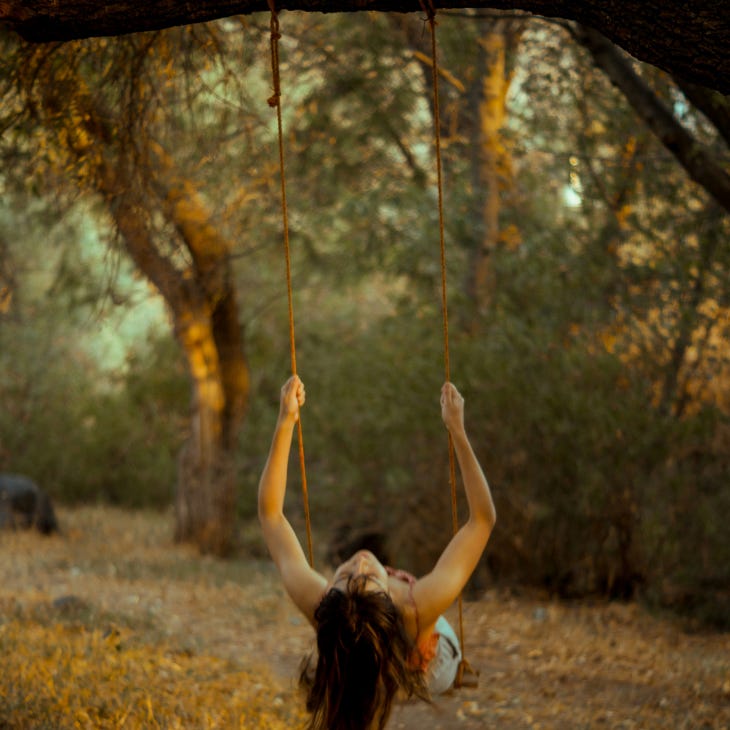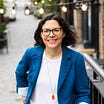Hello Anti-Misogynists!
Today we are delighted to bring you a guest post by
, whose Substack Bad Mothers covers reproductive rights and maternal ambivalence in culture and literature.Monica’s novel-in-progress The Mother Law was longlisted in the Lucy Cavendish College Fiction Prize and runner-up in the Borough Press open submission competition. She is from Washington, D.C., but resides just outside London in the Chiltern Hills, where she chairs the Democrats Abroad Women’s Caucus. You can find her on social media as @monica_is_reading, and at her website, monicacardenas.com.

The Stories of Non-Maternal Women Are All Around Us
It is misogynistic to expect women to do the work of raising a family for free and with little to no social safety net in place, and it is misogynistic to insist that all women are “destined” to be mothers.
It shouldn’t be, but motherhood is political, especially in the United States where it seems the government is hell-bent on making it nearly impossible to afford to raise a family while also insisting that everyone should have more children.
It also shouldn’t be a controversial choice to not have kids.
I have decided not to have children, but I do know plenty of moms who relish being a mother and have few complaints. I know moms who really struggle with their role, even though they clearly adore their children. I know some women who are unsure about whether they want kids or can afford to have kids. I also know lots of women who have never wanted to be a mom. I’ve spent years researching this topic and talking to people about their emotions around motherhood. I am certain that we are not all inherently meant to be mothers.
As early as 1949, feminist and philosopher Simone de Beauvoir wrote convincingly in The Second Sex to disprove the so-called maternal instinct. In 1965, feminist writer and activist Betty Friedan explored the plight of the American housewife in The Feminine Mystique, in which she asserted that women were bored and unfulfilled by their limited roles as mother and wife. In 1978, Angela Carter’s The Sadeian Woman railed against the supposed “deluded priestesshood of a holy reproductive function.” And in Women, Race & Class (1981), Angela Davis notes: “It was not a coincidence that women’s consciousness of their reproductive rights was born within the organized movement for women’s political equality.”
And yet…
Donald Trump wants to be the “fertilization president.”
JD Vance famously called women who don’t have kids “childless cat ladies” who are “miserable.”
Gov. Sarah Huckabee said during the presidential campaign that her kids keep her humble, and that Kamala Harris lacks humility since she doesn’t have kids (although she is a step-mom).
And it’s of course not just the U.S. In 2016, UK politician Andrea Leadsom remarked that she had more of a stake in the future of the country than her rival Theresa May, who does not have children. To the credit of the British people, it caused an uproar. And to her credit, Leadsom apologised and later dropped out of the race.
When I’m faced with this sort of nonsense, I like to look for the ways our culture is pushing back against the “we should all be mothers” narrative, as well as the ridiculous notion that being a mother is easy and natural rather than hard work. Skilled work.
The Patron Saint of Liars by Ann Patchett was published in the 1990s, but I adore this novel because the protagonist offers no explanations for why she plans to give up her child. Many on Goodreads are aghast at her failure to give us answers, but I think it makes her all the more admirable. Our choices don’t require explanations, and besides, maybe there is no reason.
Who watches The Office (the American version)? You may not have noticed, but Phyllis is the only non-mother in the office (not counting the annex). We do learn that she gave up a baby for adoption as a teenager, but she doesn’t ever seem to mourn her decision, and she lives a happy life with her refrigerator magnate husband. It’s refreshing that her status as child-free never even comes up!
In the novel Still Born by Guadalupe Nettel, Laura is certain about not having children, but she takes on unique caretaking roles and supports her best friend Alina through an impossible pregnancy. She’s not a cold-hearted character, she simply doesn’t want kids.
Apart from women who don’t want to be mothers, there are endless stories of mothers who have had enough. The Escape film was released in 2017, and features a woman with a husband and two children who is desperate for more meaning in her life. She loves her family, but she leaves anyway. The Lost Daughter, a novel by Elena Ferrante (and a film starring Olivia Colman) tells nearly the same story. A mother with two kids she loves, but with other passions she wants to pursue. Without money for childcare or a husband who picks up the slack, she leaves.
Anne Tyler has made a career out writing quiet stories about the evolution of family relationships, often centering a mother in middle age searching for something to do once her children go off to lead their own lives. My favorite is Ladder of Years. In this novel, Delia tires of her family treating her like a nuisance, so she leaves the beach where they are on vacation, leaves the beach house where they’re staying, and hitches a ride to another town, where she starts a new life before they’ve even finished sunbathing for the day. It is a brilliant novel about all that we take for granted in family, and the complexity of all women beyond motherhood.
The Abandoners by Begoña Gómez Urzaiz was translated to English last year and reviews mothers who left their children, including writers like Doris Lessing and fictional characters like Joanna in the film Kramer vs Kramer.
These stories exist all around us – in Hollywood and in books, but most importantly, in real life. Fiction may seem a futile exercise, but it has the power to change our culture. This change, when it finally arrives, will be a tool toward granting us equality and respect. And in the meantime, it’s nice to see mothers and non-mothers reflected back to us in all their complexity.






This topic is so important. If this type of womanhood was available to me, I’m not 100% sure I would identify as non-binary.
Loved this. It is especially impactful in these times -- not to mention some enticing summer reading ideas!